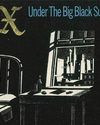CATEGORIES
فئات

MY PEDALBOARD STEVE HACKETT
WHAT THE PROG-ROCK ICON SEES WHEN HE LOOKS DOWN

Yasmin Williams
A FOLK GUITAR VIRTUOSO BRANCHES OUT ON HER THIRD ALBUM, ACADIA

Martial Artists
COBRA KAI COMPOSERS ZACH ROBINSON AND LEO BIRENBERG TALK GEAR, SEASON 6 AND HOW THEY CONSCRIPTED TOSIN ABASI, CHARLIE ROBBINS AND POLYPHIA'S TIM HENSON INTO THEIR MUSICAL DOJO

CIRCLING BACK
From an incomplete Gregg Allman track to appearances by former ABB bandmate Derek Trucks, Warren Haynes’ gripping new album oozes with Allman Brothers Band mojo

PEAVEY
Now celebrating six decades in the music business, Peavey offers something for every kind of player. CEO Courtland Gray looks back on the company’s most beloved products, including gear designed with Eddie Van Halen

Spiral XP
SHOEGAZE SUPERFAN MAX KEYES EMBRACES OPEN TUNINGS, PITCH BENDS AND MORE ON HIS LATEST ENDEAVOR

Times' New Roman
ON ALBUM NUMBER FIVE, JINJER GUITARIST ROMAN IBRAMKHALILOV IS LAYING DOWN SOME OF THE HARDEST-SWINGING RIFFS OF HIS CAREER

LOST CLASSICS: X
BILLY ZOOM RECOUNTS THE MAKING OF THE ICONIC L.A. PUNKS’ 1982 MAJOR-LABEL DEBUT, UNDER THE BIG BLACK SUN

Neon Nightmare
HOW SPIRIT ADRIFT'S NATE GARRETT CREATED A BRILLIANT ONE-MAN HOMAGE TO TYPE O NEGATIVE

BUCK DHARMA
Blue Oyster Cult co-founder Donald Buck Dharma” Roeser revegls how the classic Reaper” riff come about ond the secret recipe to his beloved CheeseBerger guitar

Don't Try This at Home
Comedians Kate Berlant and Jacqueline Novak are searching for their health holy grails-while trying not to fall for the bogus MAHA stuff.

A 'Bright Spot' in Washington
Senators Angela Alsobrooks and Lisa Blunt Rochester aren't going to let that other election result prevent them from making history.

Sisterhood, Interrupted
Online, going \"no contact\" is often seen as liberating, empowering. If only I felt that way.

"I Wish More Designers Had That - a Real and Specific Sense of How They Want a Woman to Dress in 2025"
TEN YEARS OF FASHION: A Conversation Between CATHY HORYN and LINDSAY PEOPLES

Do These Dupes Make Me Look Rich? AT QUINCE, THE ANSWER IS ALWAYS “YES."
How a one-stop shop for everything from cashmere sweaters to caviar seduced a generation of jaded shoppers.

Which Celebrity Book Club Could (Actually) Change Your Life?
In the beginning, there was Oprah. Now, there are over a dozen celebrity-helmed book clubs that could make an author's career. But do they actually move the needle? \"It used to be that if you got a big book-club pick, your book was an automatic best seller, and that is so not the case anymore,\" says one publicist. We asked 15 authors and industry insiders what these clubs can really do for a book.

BOW DOWN TO DOECHII
Fresh off her Grammy win, the unapologetic Florida rapper is just getting started.

Confessions of a K-рор Star
For ROSÉ, writing her debut solo album was a form of therapy.

AT THEIR LEISURE...
FUN CLOTHES belong on FUN PEOPLE. So in NEW YORK and LOS ANGELES, we brought together 11 of our FAVORITE FOLLOWS, including the TIKTOK CELEBRITIES, ARTISTS, and MUSICIANS who are ALWAYS IN OUR FEEDS and on OUR MINDS, to talk about their secret (AND SOME NOT-SO-SECRET) PASSIONS and GUILTY PLEASURES. Who are they when NOBODY'S WATCHING?

This Is Getting Interesting
The accessories are especially covetable this spring: futuristic sunglasses from Prada, lively little bags from Louis Vuitton, embellished socks from Fendi, and bejeweled headpieces from Valentino. Street-style darling Chloe King shared her tips for piling them on without going overboard.

BIENVENIDO A BAD, BUNNY'S PUERTO RICO
BENITO ANTONIO MARTINEZ OCASIO's new album is a history lesson and a homecoming.

THE JESSICA & ASHLEE SHOW
One Simpson followed the rules, the OTHER BROKE THEM. Now, for the first entry in the Cut's \"Family Album\" series, JESSICA SIMPSON tells ASHLEE SIMPSON ROSS she's TAKING NOTES from her younger sister and refusing to let \"MEN IN SUITS\" boss her around.

GONE OFF THE GRID
In December, a fervent nationwide search for Hannah Kobayashi ended a 30-year-old named declared that she wasn't abruptly after police a missing person at all. The internet sleuths weren't satisfied.

Proxima NEW BLUETOOTH & WI-FI TECH TO RESHAPE THE WIRELESS INDUSTRY
Apple has consistently pushed the envelope in terms of innovation, working to reduce its reliance on third-party suppliers while continuing to develop robust, energy-efficient devices.

MUSK SAYS HE'LL WITHDRAW $97.4 BILLION BID FOR OPENAI IF CHATGPT MAKER REMAINS NONPROFIT
Elon Musk says he will abandon his $97.4 billion offer to buy the nonprofit behind OpenAI if the ChatGPT maker drops its plan to convert into a for-profit company.

TEXAS COUNTY APPROVES HOLDING ELECTION TO MAKE SPACEX'S STARBASE ITS OWN CITY
A Texas county on Wednesday approved holding an election sought by SpaceX that would let residents living around billionaire Elon Musk ‘s company decide whether to formally create a new city called Starbase.

GOOGLE HUB IN POLAND TO DEVELOP AI USE IN ENERGY AND CYBERSECURITY SECTORS
Google and Poland on Thursday signed a memorandum for developing the use of artificial intelligence in the country’s energy, cybersecurity and other sectors.

HOW ELON MUSK $97.4 BILLION BID COMPLICATES MATTERS FOR OPENAL
OpenAI CEO Sam Altman has dismissed a $97.4 billion takeover bid led by rival Elon Musk, but the unsolicited offer could complicate Altman's push to transform the maker of ChatGPT into a for-profit company.

SEC REQUESTS A PAUSE IN LEGAL BATTLE WITH BINANCE AS THE AGENCY ADAPTS A CRYPTO-FRIENDLY STANCE
The U.S. Securities and Exchange Commission is seeking to pause its high-profile lawsuit against the cryptocurrency exchange Binance as the regulator tries to present itself as more cryptofriendly under a new administration.

EV MAKER SCOUT MOTORS WANTS TO SELL DIRECTLY TO BUYERS BUT CAN'T DO IT IN ITS HOME STATE
Volkswagen-backed Scout Motors is making a massive bet in the electric SUV market with a carefully cultivated experience that will allow some customers to buy the company’s vehicle in minutes on an app and then use it to handle everything after from repairs to updates and upgrades.